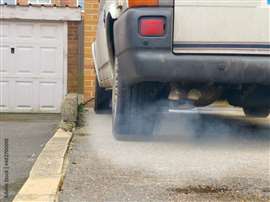NHTSA proposes new light vehicle fuel efficiency targets
01 August 2023
 New NHTSA regulations would cut emissions
New NHTSA regulations would cut emissions
The National Highway Traffic Safety Administration (NHTSA) has proposed new fuel efficiency targets intended to reduce vehicle emissions and related consumer costs.
The agency is reported to be ‘taking public comment on various options’, but the preferred proposal involves a targeted annual 2% improvement in fuel efficiency for passenger cars and an annual 4% improvement for light trucks.
The proposals would come into effect for the 2027 model year – in the United States, vehicle model years are generally introduced a year in advance. This would see the new targets come into effect in calendar year 2026.
Carried through to model year 2032, it is estimated that the annual percentage improvements would see average light vehicle fuel economy figures reach 58 miles per gallon.
“CAFE standards have driven the auto industry to innovate in improving fuel economy in ways that benefit our nation and all Americans,” NHTSA acting administrator Ann Carlson said. “The new standards we’re proposing today would advance our energy security, reduce harmful emissions, and save families and business owners money at the pump.”
In addition to passenger cars and light trucks, the proposals further outline 10% improvements per year for commercial pickups and work vans with GVW ratings exceeding 8500 lbs (approx. 3850 kg) and less than 14,001 lbs (approx. 6350 kg). This would come into effect for the 2030 model year and run through MY 2035.
Jason Zimbler, Light-Duty Vehicle director at CALSTART, a US-based non-profit which lobbies for clean transportation, said: ““Better fuel economy in passenger vehicles is what the American people value and what they want to see from vehicle manufacturers and sellers. The proposed rules will help spur our economy, protect the health of those we love, and improve the environment.”
According to CALSTART, the changes would help to ensure national energy independence. The changes would save an estimated 88 billion gallons of gasoline and prevent more than 900 million tonnes of CO2 emissions.
The NHTSA puts forward that the benefits of the proposal exceed related costs by more than $18 billion.
A 60-day public comment period will start following entry of the proposals into the Federal Register.
POWER SOURCING GUIDE
The trusted reference and buyer’s guide for 83 years
The original “desktop search engine,” guiding nearly 10,000 users in more than 90 countries it is the primary reference for specifications and details on all the components that go into engine systems.
Visit Now
STAY CONNECTED




Receive the information you need when you need it through our world-leading magazines, newsletters and daily briefings.
CONNECT WITH THE TEAM













